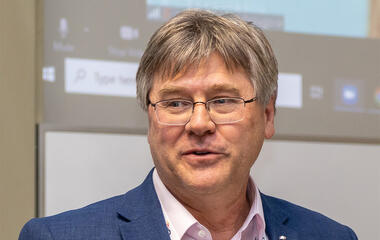Despite the important work African researchers are doing to provide knowledge and understanding about climate science to society and policy-makers, the continent’s climate scientists lack visibility on the international stage because there are just not enough resources to build the sustainable institutions required.
This is a major issue that needs to be addressed urgently, and African negotiators could be making these points more strongly when the world comes together at the United Nations Conference of the Parties, or COP28, in a few weeks’ time, according to Professor Guy Midgley, the acting director of the School for Climate Studies at Stellenbosch University (SU) in South Africa.
The establishment of the school, which was spearheaded by Midgley in 2021, has made it possible to bring together the expertise of different faculties to tackle some of the most pressing issues around climate change in the region through transdisciplinary approaches.
During an interview with University World News ahead of the upcoming 28th session of the Conference of the Parties, or COP28, that will take place in Dubai, United Arab Emirates, from 30 November to 12 December 2023, the seasoned climate scientist supported recent messages on mitigation action, adaptation needs, a loss and damage mechanism, and the question of sustainable transition funding for the region.
UWN: In 2022-23 some of the worst climatic events in decades have been recorded, including devastating floods and extreme heatwaves. Heading to COP28, how are these likely to be addressed and what are some of the pressing issues you would want to see on the agenda, particularly for Sub-Saharan Africa?
GM: What is most needed is a strong decision on mitigation, on emission reduction targets, but it doesn’t look like this is as much of a priority as I would prefer to see. It is in Sub-Saharan Africa’s interest to have an ambitious mitigation target and action plan, because we are already feeling the effects of climate change.
Impacts in Africa will only get worse, therefore it is most important that Africa communicate that message loud and clear. There is a lot of ancillary work on other solutions to the challenges we face, whereas, in fact, a major focus should be the move away from fossil fuels as urgently as possible.
The other the big issue for Sub-Saharan Africa is loss and damage, so the mechanism for this, while also meeting funding needs for adaptation responses … is absolutely critical.
UWN: Looking at the outcomes from COP27, what progress has been made and, from an academic perspective, what needs to be done to prepare African leaders for the upcoming COP?
GM: Progress has been slow, with some distractions from the main issues, but the rapid ramping up of a sustainable energy system via significant sustainable transition funding and partnerships to achieve that, will be vital.
The African Union announced a strong stance after the recent Africa Climate Summit on mitigation. There is much information in the recent IPCC [Intergovernmental Panel on Climate Change] reports that would support African negotiators in defining and pursuing their primary interests for the benefit of African peoples. These include highlighting mitigation, adaptation and addressing the adaptation gap.
There is a really massive opportunity for Africa to go through a sustainable transition which would be a great benefit for many decades and generations to come, but we have to seize the moment now and focus specifically on the critical issues.
UWN: What has been the role of science and innovation during COP processes? Would you say research from and about Africa is being widely recognised and applied to COP decision-making?
GM: Africa is at the back of the queue when it comes to funding for climate change science. We receive about 3% of global funding for climate research, according to the recent IPCC and, of that, a large portion flows to non-African researchers.
This is clear evidence that the international community does not see funding African research capacity in climate change as a priority. The deeply unfair result is that African countries have to invest more of their own resources into research on an issue for which they are least responsible.
African climate change science, therefore, lacks visibility on the international stage because there are just not enough resources to build the sustainable institutions required, and very few of our scientists have any visibility in the climate change science space. This is a major issue and it needs to be addressed urgently, and African negotiators could to be making these points more strongly with ample evidence behind them.
It is enormously important for African scientists to have the resources. The regional IPCC report for Africa is, in my opinion, the most thoughtful, innovative and effective report by any region of the world, despite the lack of resources.
Africa is, therefore, making incredibly efficient use of the available resources for science and evidence-building, despite its low visibility. Unfortunately, research agendas remain driven by more visible Northern Hemisphere scientists, who are also, in some cases, funded to work in Africa.
That is a major challenge because you see the agendas driven by Northern Hemisphere interests. We need our own science for Sub-Saharan Africa; we have unique ecosystems, unique livelihoods, unique organisations and development trajectories, and we need our own unique approaches supported by strong technological capacity in the region.
We do not have it and that is because we are underfunded and under-supplied by the international community and have been for decades. This needs to be urgently addressed.
UWN: Universities have been tasked to contribute towards climate action and sustainable development. What are some of the new developments or breakthroughs in research or climate initiatives from your institution, and what is the significance of this work for the region?
GM: The region is pushing forward on novel solutions, nature-based solutions, renewable energy pathways and a lot of work needs to be highlighted around local indigenous knowledge, equality, equity, gender issues.
There is a wide range of activities, particularly transdisciplinary studies, which are enhancing the traditional sectoral approaches. We are looking increasingly at cross-sectoral issues such as the nexus between water, food, energy, health, and human migration. These approaches address real, everyday issues that affect people, from poor to rich.
A majority of African communities lack the financial resources to adapt and are quite dependent on stable climates for their food security. People in Sub-Saharan Africa are highly vulnerable and we have seen the effects of recent extreme events such as the floods in Mozambique and an increase in extreme events such as coastal storms and disease outbreaks.
SU is developing and rolling out courses in sustainable transitions, sustainable development, and climate variability and climate change, to support learning in understanding of impacts, adaptation and mitigation. While it takes time to develop new academic offerings, we are also enhancing and adding new content to existing courses, which can be done much more quickly, and up-scaled in time.
Our School for Climate Studies is a transdisciplinary faculty-level entity that was launched to seek solutions to these challenges and is coordinating with different faculties in building on our expertise.
This is being done in fields including agri, biological, medical (community health and pandemic control), engineering, renewable energy, water resources, geography and social sciences. This new kind of transdisciplinary effort is needed in universities to address complex problems like climate change.
Some universities are starting to move in this direction, but many are stuck in the traditional ways of dealing with issues from a sectoral or deep knowledge and specialisation perspective. We cannot solve emerging complex problems with this knowledge alone. We need transdisciplinary thinking to drive the new breakthroughs.
UWN: Leadership for change is a crucial theme for climate action and sustainable development. As the acting director for the School for Climate Studies at SU, what would you say are the key roles of educational leaders in advancing and supporting climate action and sustainable development in the region?
GM: As leaders, it is important to be visible, reinforcing and improving people’s understanding across a broad range of climate issues. Educational leaders must also be involved in understanding or producing new knowledge, leading initiatives to attract funding, training postgraduate and undergraduate students and building the skills working across entities and institutions.
In climate change science, leaders can productively engage with policy-makers, developing policy briefs, crystallising the key risks and informing the policy-makers. We are attempting to expand such efforts with our partners across South Africa and the rest of the world.
UWN: One of the key challenges facing nations in Africa has been identified as the science and policy gap. What can be done to ensure that academia participates fully in climate discussions, policy development, and implementation?
GM: Academia identifies the challenges and is very involved in policy research. It drives a lot of the background knowledge on important policy-making around climate change.
Without academia, we wouldn’t have IPCC reports which are packed with scientific information and findings. Therefore, academia and the science assessment processes are playing a vital role in distilling information and presenting it to policy-makers to inform their positions.
African scientists could be doing much more, especially with appropriate levels of international funding support.
University World News














